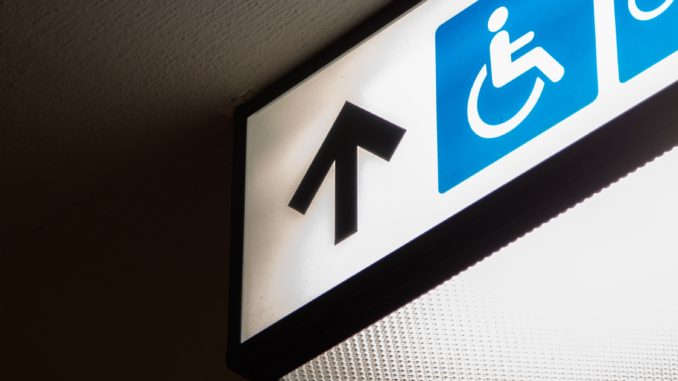
At a meeting of the Sydney City’s Council Inclusion Advisory Panel last month, mayor Clover Moore heard a suggestion from Mark Tonga, a member of the panel and a person with a disability, that using the term ‘Access Inclusion Seeker’ would come off better than the term ‘disabled’.
‘Perhaps sooner than you think, the ‘d’ word will become as offensive as the ‘n’ word’, Tonga remarked. ‘So how about… Access Inclusion Seekers?’
The Daily Telegraph then made a headline of Tonga’s submission: ‘Clover Moore considers plan to call people who are disabled ‘Access Inclusion Seekers’.
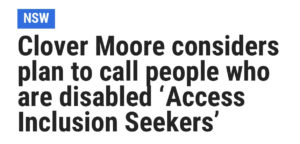
Publication The Mighty reported that it was Clover Moore who came up with the phrase, in the headline: ‘Mayor Proposes Bizarre Phrase to Replace the Word Disability’.
Meanwhile, 10 Daily, Ben Fordham of 2GB and The Daily Mail relayed the controversy to social media, which triggered further debate.
Presumably since the Lord Mayor was the one in high headlines, the many unsupportive Facebook commenters perceived ‘Access Inclusion Seekers’ to be her proposal.
‘Clover Moore is an intellectual access inclusion seeker’, one respondent pronounced.
On Twitter, ‘Team Clover’ City of Sydney Councillor Jess Scully hit back at The Daily Telegraph.
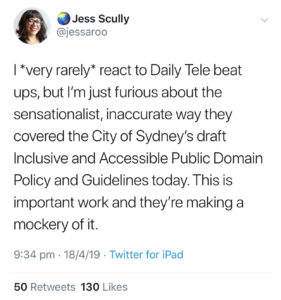
‘I *very rarely* react to Daily Tele beat ups, but I’m just furious about the sensationalist, inaccurate way they covered the City of Sydney’s draft Inclusive and Accessible Public Domain Policy and Guidelines today. This is important work and they’re making a mockery of it.’
While Councillor Scully admitted to her Twitter followers that The Daily Telegraph recorded Tonga’s remarks correctly, she took issue with the way they had been ‘distorted by the Tele into an official position of the Council’.
The draft, which can be read here, puts forward various measures by which the City of Sydney is to become a more inclusive and accessible public domain.
The policy and guidelines articulate how the City will meet its obligations under the Disability Discrimination Act 1992 and the Disability Public Transport Standards 2002 in public space, and contribute to the City’s efforts to create liveable communities as required by the NSW Disability Inclusion Act 2014.
It is notable that the City of Sydney’s current Access Policy, developed in 1992, has not been reviewed since 2002. While current legislation pertains to providing dignified and equitable access to buildings within the City of Sydney, there is no such equivalent for public domains, as such.
With reference to design, maintenance and management of public domain spaces and infrastructure, the draft seeks to fill a policy gap in order to improve accessibility in the City of Sydney.
Outside of the ruckus sparked by Tonga’s unpopular ‘Access Inclusion Seekers’ submission, coverage of the Council’s draft, which intends to alter the living standards of people with a disability significantly, has been minimal.
India Murphy of ‘Infrastructure Magazine’ was one of few to commend the draft, writing that:
“A new policy from the City of Sydney will help create more inclusive streets and open spaces for communities.”
In that neither Mark Tonga’s personal website, where he refers to himself specifically as a ‘disability’ advocate) nor the City of Sydney’s new draft mention the term ‘Accessibility Inclusion Seeker’ in their contents, Jess Scully may be right to put it to her Twitter followers that The Daily Telegraph blew the event ‘out of proportion’.
The publication’s reputation is up in the air after their extraordinary blunder in 2018 at the expense of thirty-four year-old Eryn Jean Norvill, or arguably veteran Australian actor Geoffrey Rush.
But the dilemma of inclusive language extends beyond what unscrupulous agenda the tabloid press may have.
Even within marginalised communities, inclusive language lies between the hammer and the anvil.
As Hayden Moon, a 2019 Disabilities Officer for the USYD Disabilities Collective & Caregivers Network, puts it, ‘It’s hard to find an umbrella term for everyone.’
‘Some prefer ‘a person with a disability’’. Moon explains. ‘I prefer identity-first language: ‘disabled person’’.
The reclamation of terms historically used as pejoratives towards marginalised groups adds further complexity to the scope of inclusive language:
‘Others are reclaiming terms that were previously used as slurs as a way of showing pride: for example, ‘cripple’,’ says Moon. ‘I personally refer to myself as ‘blind’ rather than ‘vision impaired’ or ‘legally blind’ because I find value in my disability. It has shaped how I see the world, and it has led to my love of music and dance.’
Beyond his duties as Disabilities Officer at USYD, Moon is an Honours student, a performer, and a prominent local activist for transgender and Indigenous rights.
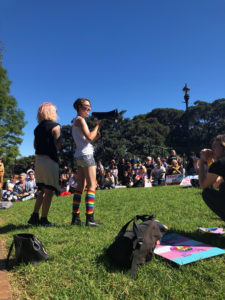
Moon takes the view that ‘Access Inclusion Seekers’ is an ‘inappropriate’ term, but while the community will inevitably disagree amongst themselves, because ‘there isn’t one experience of disability’, The Daily Telegraph has only created a furore to the benefit of themselves.
‘I think there are issues in regards to ethics in the article, it seems that articles like this are just designed to cause a fuss… it has caused more stigma and alienation of the disabled community unfortunately.’
‘This shouldn’t be how our community feels in response to an attempt at inclusion.’
The City of Sydney Council Inclusion Advisory Panel is formed of Max Burt, Judy Harwood, Dr Phillipa Carnemolla, Nidhi Shekaran, Tara Ellife, Sabrina Houssami-Richardson, Julie Millard, Riana Head-Toussaint, Morwenna Collett and Mark Tonga.
Between them are years of experience in the state government, working on disability strategies, in advocacy across many areas and communities, entrepreneurs, consultants, academics, and leaders in their fields.
Being a member of the City of Sydney’s Inclusion Advisory Panel gives members the opportunity to be heard, to express their opinions, and help to effect change.
‘There is a lot of pride in the disabled community, we shouldn’t be ashamed of our difference.’ Moon believes.
The draft for the City’s Inclusive and Accessible Public Domain Policy and Guidelines is a ‘serious’, significant step for accessibility in Sydney, which Councillor Jess Scully believes should not be overshadowed by The Daily Telegraph’s ‘beat-up’, and can be read here.
Mark Tonga, Jess Scully and Clover Moore were all contacted for comment on this issue, but did not respond.

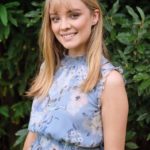
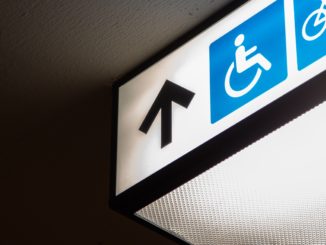
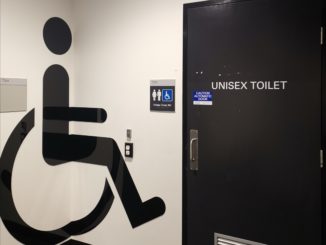

Be the first to comment